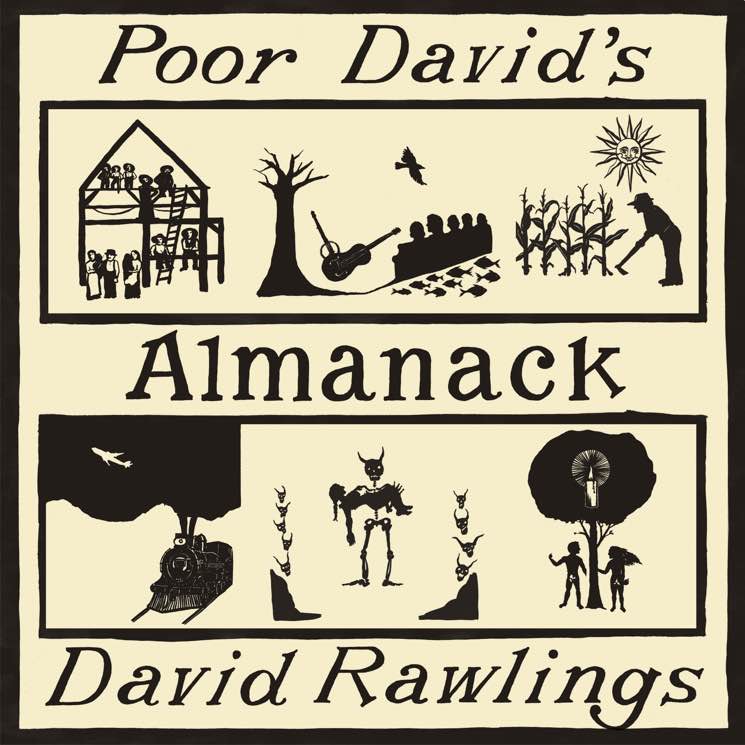David Rawlings' Poor David's Almanack picks up where Nashville Obsolete left off — with that gorgeous, spacious, sepia-toned timelessness and motion that Rawlings and his longtime partner, Gillian Welch, conjure so well. Rawlings' third solo album, and first after dropping the Dave Rawlings Machine moniker to simply use his name, Almanack sees Rawlings and Welch joined by labelmate Willie Watson, fiddler Brittany Haas and members of Punch Brothers, Old Crow Medicine Show, Dawes and more.
The Rawlings-Welch co-writes, in particular, feel akin to the long traveling songs off Obsolete (though only one of these songs clocks in at over five minutes; the rest are shorter): There's the familiar train motion of opener "Midnight Train," which introduces circular themes of time and travel along with a sense of locomotion, and the slower, more soaring "Airplane," which conveys sad tension between life and transcendence. In the latter, a driver imagines what he could do if he could fly: "I'd fly over every sorrowful thing," Rawlings sings over a chorus of sky-high strings, while Haas's earthy fiddle tugs towards the middle ground. It's also a good example of the nearly dripping fluidity of Rawlings' guitar playing. The duo also revisit their love of heavier Neil Young-style roots rock on the eerily CSNY-like "Cumberland Gap," the two trading off lead vocals and harmonizing on a tune that Rawlings started and Welch finished.
The songs that Rawlings wrote on his own (half this time) tend to be shorter, lighter and more old-timey — "Come on Over to My House," for example, or the silly, infectiously semi-nonsensical banjo tune "Money Is the Meat in the Coconut," (perhaps the next classic pass-the-hat tune?).
Rawlings turns a wry gaze appreciatively towards women for both "Yup" (a story centred on a woman who kicks the Devil's ass and gets sent back from hell) and "Good God a Woman," the Judeo-Christian creation myth updated with a sing-along chorus.
Rawlings' and Welch's music always feels like a return visit, and Poor David's Almanack in particular seems perfectly suited to tack up on your wall and consult at home.
(Acony)The Rawlings-Welch co-writes, in particular, feel akin to the long traveling songs off Obsolete (though only one of these songs clocks in at over five minutes; the rest are shorter): There's the familiar train motion of opener "Midnight Train," which introduces circular themes of time and travel along with a sense of locomotion, and the slower, more soaring "Airplane," which conveys sad tension between life and transcendence. In the latter, a driver imagines what he could do if he could fly: "I'd fly over every sorrowful thing," Rawlings sings over a chorus of sky-high strings, while Haas's earthy fiddle tugs towards the middle ground. It's also a good example of the nearly dripping fluidity of Rawlings' guitar playing. The duo also revisit their love of heavier Neil Young-style roots rock on the eerily CSNY-like "Cumberland Gap," the two trading off lead vocals and harmonizing on a tune that Rawlings started and Welch finished.
The songs that Rawlings wrote on his own (half this time) tend to be shorter, lighter and more old-timey — "Come on Over to My House," for example, or the silly, infectiously semi-nonsensical banjo tune "Money Is the Meat in the Coconut," (perhaps the next classic pass-the-hat tune?).
Rawlings turns a wry gaze appreciatively towards women for both "Yup" (a story centred on a woman who kicks the Devil's ass and gets sent back from hell) and "Good God a Woman," the Judeo-Christian creation myth updated with a sing-along chorus.
Rawlings' and Welch's music always feels like a return visit, and Poor David's Almanack in particular seems perfectly suited to tack up on your wall and consult at home.
